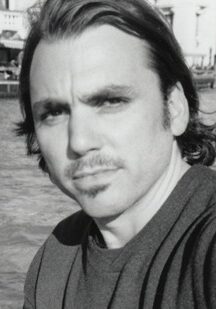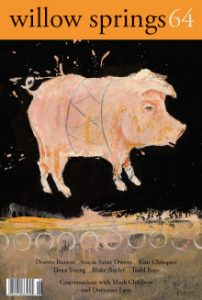
About Denver Butson
Denver Butson is author of three books of poetry: triptych (The Commoner Press, 1999), Mechanical Birds (St. Andrews Press, 2000), and illegible address (Luquer Street Press, 2004). His poems have appeared in dozens of journals , anthologies, blogs, websites, and the likes, and have been praised by such figures as WS Merwin, Tomaz Salamun, Thom Gunn, Theodore Enslin, Jim Harrison, Agha Shahid Ali, Ned Rorem, and Billy Collins, and regularly appear on Writer’s Almanac on National Public Radio. He is at work on several children’s books, a cookbook with no recipes, captions for photographs that haven’t been taken yet, and a series of poems for the VIEWMASTER.
A Profile of the Author
Notes on “The Drowning Ghazals”
I started writing drowning ghazals, once upon a time, before I moved from Richmond, Virginia, to New York, before I married, before the towers fell outside our kitchen window, before we had a baby, before I gave up teaching so I could do something that would potentially be more lucrative and closer to home and my daughter and allow me to write more without the conversations from the classroom and the struggles of my students stepping into the quiet of my writing studio. I was teaching a creative writing workshop to a mixed bag of writing students and non-writing students, to a self-proclaimed “manifest genius” and reincarnation of Mayakovsky and a charismatic “Jazz Poet” who clicked his fingers and pronounced every word, no matter how banal, as if it were his gift to whoever was listening, and trying to excite the rest with the possibilities of sound and form and image and not just personality and bombast.
We read poems aloud, we took them apart and imitated them; we did exercises in image and form. One such exercise was to write a ghazal with instructions in a craft book from the esteemed Persian poet Agha Shahid Ali. I explained the form, heard the groans, and went home, only to realize that I had asked my students to do something that I myself had never done. While I had been experimenting with form (after a failed attempt to shake my writing up and write traditional sonnets, I started writing 14-word poems, followed by 28-word poems, and then by 42 and 56-word poems), culminating in my first invented form, I believe, the textual marriage, in which I alternated lines from two different texts, unedited, to create a new “poem,” but I hadn’t really written in any prescribed and traditional forms.
The next morning, I decided I would write a ghazal. I read Ali’s instructions and started, but I couldn’t hold myself to the general form he outlined (I remembered the freedom of Jim Harrisons Ghazals and felt restricted) but I did like the music that was happening with the repetition. Still, I wanted to do something different with them, instead of simply writing 5 unrelated couplets, the second line of which ended with the same word as the first line of the poem—with the author’s name or signature in the last couplet. So, I decided to steal that first line from another source, giving me something to work off of. And, I decided because I was writing a lot of poems with drowning in them at the time (perhaps partly because of seeing Magritte’s painting of the woman washed up on the beach that summer in Chicago) to add the concept of, an allusion to, or the word drowning itself to the middle couplet.
It wasn’t until two or three years and dozens, possibly a hundred, drowning ghazals later (and even crafting a section of my first book, triptych) later that I realized that my ghazals were incomplete, even wrong. My wife and I went to a dinner party at Edmund White’s apartment in Chelsea with the likes of Peter Carey and other well-known literati, and I had the pleasure of meeting Agha Shahid Ali there. Edmund had given him some of my ghazals, and Shahid declared himself a “big fan” of them. However, he informed me, even though they were more faithful to the form than most American poets’ version of the ghazal, I was doing them wrong—I was leaving out the rhyme before the refrain. We walked him to Penn Station and he told me that I had to write more ghazals, that I had to do the refrain.
Shahid and my wife and I became good friends, in the couple years before Shahid died way too young, and he remained a strong supporter of my now more correct ghazals, even putting a few of them in his anthology Ravishing Disunities: Real Ghazals in English. Rather than struggle more with this new requirement, I was even more thrilled by the possibilities and music inherent in the refrain followed by the rhyme. I went back and “fixed” some of the older ones and wrote hundreds more. Now, seven or eight years later, I’m not writing as many as I once was, but I still find myself returning to them—reading a poem or a snatch of fiction and realizing that there’s an excellent first line there that could open a ghazal. There’s still the drowning in the third couplet. There’s still my name or a reference to it in the final couplet. It’s getting harder for them to feel fresh to me, but I still return, like a musician returning to the ballad long after he has stopped writing or singing ballads. Or, as Sonny Rollins says about melody, it’s a nice place to land from time to time to remind yourself (and your listeners) where you are.
Notes on Reading
Right now I’m mesmerized by Paul Harding’s Tinkers and Gary Young’s poems. After my mother died, I read a bunch of James Wright’s poems to my brother in his kitchen and was stunned by them all over again. I also regularly return to Anne Carson, Michael Ondaatje, Russell Edson, Charles Simic, and Vicente Huidobro. I can’t stop reading John Yau and Claire Malroux and Federico Garcia Lorca. I don’t read nearly as much as I used to—hard to with a child in the house—but I am reading a lot of great children’s books (and am especially in love with the simple straightforward and decidedly modern ones by Esphyr Slobodkina and Ruth Krauss and Arnold Lobel in the 1950s and 1960s and the more recent ones by Remy Charlip), and I read in my studio when I’m writing, pulling out books and reading whatever line my eye falls on.


